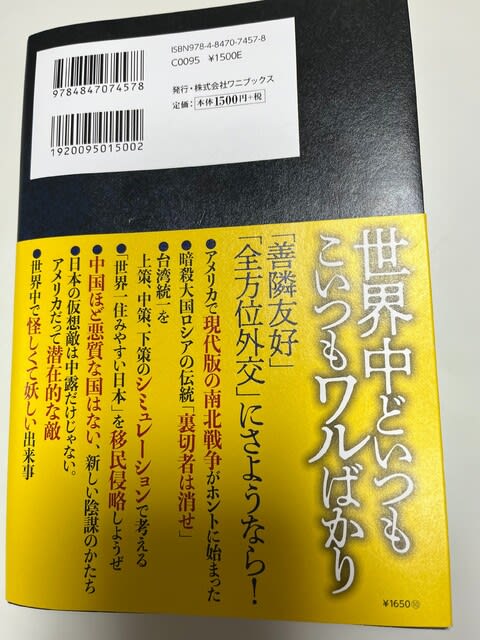Masahiro Miyazaki is a researcher and writer who is arguably the Tadao Umesao of today.
I glanced at his latest work and was convinced this is one of his best books.
It is one of the best books he has ever written.
It is a must-read not only for the people of Japan but for people all over the world.
I want to introduce a unit from page 148 in this paper.
Gone with the Wind, Gone with China.
Many economists and certain economic newspapers have been saying, "China's economy will continue to prosper," but it was a lie.
Gone With The Wind," Margaret Mitchell's masterpiece.
"Gone," the South China Morning Post sarcastically reported (February 16, 2024).
It was an honest report of the reality that many Chinese perceive that China's economic prosperity is over, the real estate puzzle has collapsed, and the era of luxury is gone.
In March 2024, Hong Kong revised its "Security Ordinance" and added restrictions on foreign companies and the press.
As a result, VOA (Voice of America) will close its Hong Kong office.
How long will the South China Morning Post be able to report freely?
Rupert Murdoch's News Corp. bought the venerable English-language newspaper in 1987 and became part of Malaysian overseas Chinese Robert Kwok's (Guo Hengnian) Kerry Media in 1993.
In 2015, it was acquired by Ma Yun's Alibaba Group.
During the British colonial period, it was considered the official newspaper of the Hong Kong Government.
Alibaba is at odds with the Chinese Communist Party, and Ma Yun has effectively fled abroad, jeopardizing the newspaper's operations.
Dragon dances, not lion dances, mark the Chinese New Year, paraded through the streets.
It is a famous event in Chinatowns worldwide and draws enormous crowds.
After the Corona disaster, the travel boom has resumed, and the authorities have made a rosy prediction that 9 billion people will travel during the 8-day Chinese New Year holiday.
There were frequent cases of people returning to work after the Lunar New Year vacation only to find that their companies had closed.
The unemployed are in a continuous search for jobs.
On February 14, 2024, the China High Speed Rail had 14.25 million passengers for one day alone.
The overwhelming majority of the trips were from Shanghai to Hangzhou, Suzhou, and other famous scenic spots characterized by short distances.
From January 26 to January 14, 230 million people used China's domestic bullet train.
The watchwords are "cheap, close, and short" (安近短).
One-day tours from Hangzhou to Hong Kong set a new record, and domestic trips to Beijing, Shanghai, and Harbin, usually out of the average person's reach in the countryside, were also very popular.
People could no longer afford to travel abroad, so they stuck to domestic travel.
The Hong Kong trip was a "day trip" because stores were completely closed, and shopping was not possible.
Hong Kong Disneyland has few attractions and is not very attractive, and people go to Huang Tai Shan to pray for good fortune.
To begin with, Hong Kong people do not welcome Chinese because their freedom is suppressed.
Instead, the Chinese concentrated in Macau.
An average of 120,000 people visit Macau daily year-round, but during the Chinese New Year, the number averages 200,000 a day, and during the five days of the Chinese New Year, the number rises to as many as 900,000.
When the economy is in recession, on the contrary, the number of gamblers increases.
What do "ordinary people" who cannot go to Macau do?
Lottery ticket booths have increased.
They are from shopping malls to subway entrances and exits, to streets, and finally coffee shops with lottery tickets.
About one-third of them are scratch-offs (instant lotteries).
In China, there are no horse races, bicycle races, or boat races as public betting.
There was also no pachinko, so the common people bet each other's coins and played cards on the street.
The rich go to Macau.
Public lotteries are "welfare lotteries," "sports lotteries," and scratch-offs.
Lottery ticket sales 2023 increased by 37% to over $80.6 billion, or 12 trillion Japanese yen.
Since Japan's lottery ticket sales 2022 totaled 832.4 billion yen, China's lottery ticket sales are more than 12 times that of Japan.
It shows how extraordinary these figures are.
The main reason is the stress caused by the difficulty young people find jobs.
The most popular destinations for overseas travel are Thailand, Malaysia, and Singapore.
All of these countries do not require visas for Chinese nationals.
Before the Corona disaster, Japan was the top "most desired country to visit" in a survey of Chinese.
At its peak in 2019, 9.6 million Chinese traveled to Japan.
In 2023, the number was 2.4 million, a quarter of what it was in the past, even though it was on the road to recovery.
The expectations of travel agents for inbound travel have been wildly disappointing, and almost no tour groups are left.
The increase in individual travelers is said to be due to visa restrictions.
The "buying explosion" that once existed in Japan is gone.
Visitors have turned to jewelry, jewelry, and antiques.
They are looking for vintage whiskey, for example.
Film cameras, nostalgic for the Showa period, are also considered antiques and are the target of speculation.
They buy knives that cost 300,000 yen each and have their names engraved.
Brand-name goods are also still popular, but they are being bought in order of their cash value.
Japanese-made daily necessities are also popular.
In particular, pharmaceuticals, including eye drops, stomach medicine, cosmetics, and Oronoin ointment, are highly popular.
At Don Quijote, items that attract little interest from the Japanese, such as erasable ballpoint pens and stainless steel bottles, sell well.
Inbound foreign tourists to Japan are thriving, but the biggest reason is the weak yen.
Dollar holders can stay in a business hotel for as little as $120, compared to $200 in the past.
Restaurants are the cheapest in Northeast Asia.
Omotenashi (hospitality) is world-famous and not uncommon.
The Chinese, who used to make so much noise in the tourist areas, are almost non-existent.
Where did they go?
China's economic boom is over.
China has ordered the establishment of Communist Party cells in companies, including foreign-owned ones.
Next, it ordered the creation of military units within corporations.
The bad guys don't even trust their people.
Are they trying to strengthen the military effectively?
The truth is that many of those who work for Chinese companies are potentially unemployed.
Instead of weeding them out, the employees are forced to undergo military training to suppress outbursts of discontent.
There is no need to take this seriously as a "military threat.
Foreign companies and joint ventures also have Communist Party cells without exception.
In state-owned enterprises, a party secretary is incompetent at his job but is higher than the president.
They are not state-owned enterprises but rather party-run enterprises.
Several dozen companies have been found to have set up "people's armed departments" inside their enterprises.
The Financial Times, The Times of India, and other newspapers reported on February 21.
The People's Armed Forces Department was also set up in joint ventures with Japan.
This "corporate restructuring" of the military establishment, which can be described as an obsession of Xi Jinping, is organized by volunteer employees, and their obedience to the Chinese Communist Party is absolute.
Positioned under the command of the People's Liberation Army, "military training" and "political education" are conducted as part of corporate activities.
The actual situation is that the volunteers are not volunteers in name only but are reluctant to fulfill their quotas.
It must be because they have no time for corporate activities.
If the company were prosperous and busy, how would it be possible to conduct military training in the company?
At a particular company, volunteer employees were transformed into a "militia," and more than 30 participated.
The "joint venture" required when expanding into China often combines 51% Chinese and 49% Japanese.
Since the Chinese are in charge of internal management, the Japanese cannot grasp what is happening inside the company.
The existence of the People's Armed Forces was revealed not only in Japanese companies but also in major German companies that have expanded into China.
This article continues.


















